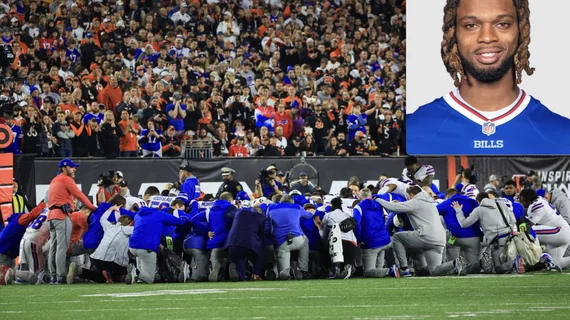Buffalo Bills Damar Hamlin incident brings sudden cardiac arrest into national headlines
Buffalo Bills safety Damar Hamlin, #3, went into cardiac arrest after a tackle during the first quarter of the game between the Cincinnati Bengals and the Buffalo Bills at Paycor Stadium in Cincinnati on Jan 2. The incident has instantly raised awareness of cardiac arrest, and brought sudden cardiac arrest to the forefront of news reports today.
"Damar Hamlin suffered a cardiac arrest following a hit in the Buffalo Bills' game versus the Cincinnati Bengals. His heartbeat was restored on the field and he was transferred to the University of Cincinnati Medical Center for further testing and treatment. He is currently sedated and listed in critical condition," the Buffalo Bills said in a statement.
Hamlin, age 24, being young, healthy and very active, is believed to have suffered from the phenomenon of commotio cordis, where the heart goes into ventricular fibrillation cause by blunt trauma to the chest. A shock from an automated external defibrillator (AED) is usually used to restore the heart to normal sinus rhythm.
After Hamlin collapsed on the field, the on-site medical team evaluated the situation and appeared to quickly remove his safety pads, begin CPR and apply an AED.
"There are about 30 cases of these a year that happen in the United States," explained David Agus, MD, CBS News medical contributor, on CBS Mornings earlier today. "These predominantly happen in kids during little league baseball, when a ball is thrown by a pitcher and hits the person in the chest. It also happens in soccer, where there is something that causes that blunt force trauma, but it is remarkably rare."
Agus said in any case of sudden cardiac arrest, it is important shock the heart and restore normal rhythm as soon as possible to prevent brain and organ damage from the stop of blood flow. He said there might be cause for concern because Hamlin is on a ventilator, which could be a sign there was some damage caused before his heart beat was restored.
"Frequently, a sudden cardiac arrest is fatal within 10 minutes unless someone is right there to give CPR chest compressions or deploy a defibrillator," explained Sumeet Chugh, MD, director of the Center for Cardiac Arrest Prevention, in a statement from the Smidt Heart Institute at Cedars-Sinai Hospital in Los Angeles. "My life’s work is focused on being able to predict sudden cardiac arrest and how to best treat the lucky few who survive."
He said sudden cardiac arrest claims at least 300,000 U.S. lives annually.
“This was traumatic for everyone, especially Hamlin’s family and teammates, but also for so many others involved and witnessing the event. More than 70% of cardiac arrests that do not happen in the hospital, occur in a home where access to medical professionals and an AED is not as readily available,” said Mariell Jessup, MD, FAHA, chief science and medical officer of the American Heart Association in a statement from the AHA. “Recognizing a cardiac arrest, calling 911 immediately, performing CPR and using an AED as soon as it is available are critical for survival. Statistically speaking, it is likely that the person will need to be helped by a family member or a friend in order to survive.”
Having community members trained in CPR and AEDs in public spaces can increase the chances of survival. The rate of bystander CPR in North America is estimated at only 39-44%, and only about 1 in 10 people survive an out-of-hospital cardiac arrest. Improving the rate of bystander CPR is critical to increasing survival from out-of-hospital cardiac arrest (OHCA).
Sudden cardiac arrest causes game to be postponed.
Hamlin's injury took place at the 5:58 mark of the first quarter. The game was postponed by the NFL after Hamlin received medical attention on the field. Cancelling an NFL game is an extremely rare occurrence, happening only a handful of times since 1933 due to labor disputes between the league and the National Football League Players Association (NFLPA), or extremely bad weather leaving the field unplayable and the spectator stands unsafe.
The NFL Week 17 game was halted with six minutes remaining in the first quarter and the Bengals leading, 7-3. In a very rare occurrence, NFL Commissioner Roger Goodell announced the game was postponed to be sensitive to the serious nature of Hamlin's injury. The move was made in agreement with the NFL Players Association.
"Last night was supposed to be a great night for the NFL and a great showcase for our hometown. Instead, the human side of our sport became paramount, and in that movement, humanity and love rose to the forefront," Bengals owner Mike Brown in a statement after the game had been postponed.
The game postponement announcement came about an hour after the injury. There is increased sensitivity about injuries after the NFL received scrutiny over previous injuries to players, most noticeably with head trauma cases, and appearing to not have done enough to protect player health and safety.
Social media posts on the incident quickly had commentary and misinformation posts from anti-vaccine proponents speculating that this cardiac arrest was due myocarditis from the COVID vaccine. While very rare, the vaccine does cause mild myocarditis in a small number of people, but the likelihood of severe myocarditis and hospitalization is actually much higher from getting COVID.
This connection might have been fueled by the case of Buffalo Bills football player Tommy Sweeney, who was the first NFL player to come down with myocarditis in November 2020 after being diagnosed with COVID-19.
Incident led to boom for Hamlin's charities
Hamlin created The Chasing M’s Foundation and launched a toy drive in 2020 through a GoFundMe page. The Associated Press reports that more than $3.7 million in donations have been received by the page since his cardiac arrest at the game last night. The initial goal of the fundraising campaign was to raise $2,500 to buy gifts for needy children.

